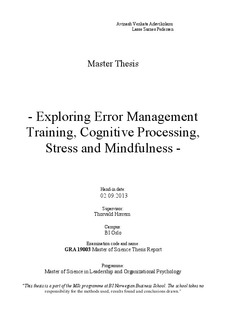Exploring error management training, cognitive processing, stress and mindfulness
Master thesis

View/
Date
2014-02-10Metadata
Show full item recordCollections
- Master of Science [1621]
Abstract
In this study we compared Error Management Training (EMT) and Traditional Training by exploring its effectiveness in relation to trainees‟ intuitive and analytical processing. Next, we examined the degree to which stress levels and mindfulness influenced intuitive and analytical processing during training. A quasi-experiment comprising of a sample of 67 business students was conducted using a computer simulation as performance measure. Simultaneously, data from skin conductance response (SCR) sensors were used to capture stress levels of the trainees. We observed that trainees who received EMT scored higher on cognitive processing i.e., both on intuitive and analytical, than those who received traditional training. Further, we found that EMT works most effective for trainees who are high on analytical processing, while traditional training is most effective for those who are low on analytical processing. In addition, data from the skin conductance response sensors revealed that high stress levels during training hindered analytical processing. Our results also suggest relationships between mindfulness and cognitive processing.
Key words: error management training, cognitive processing, stress, mindfulness
Description
Masteroppgave(MSc) in Master of Science in Leadership and Organizational Psychology - Handelshøyskolen BI, 2014